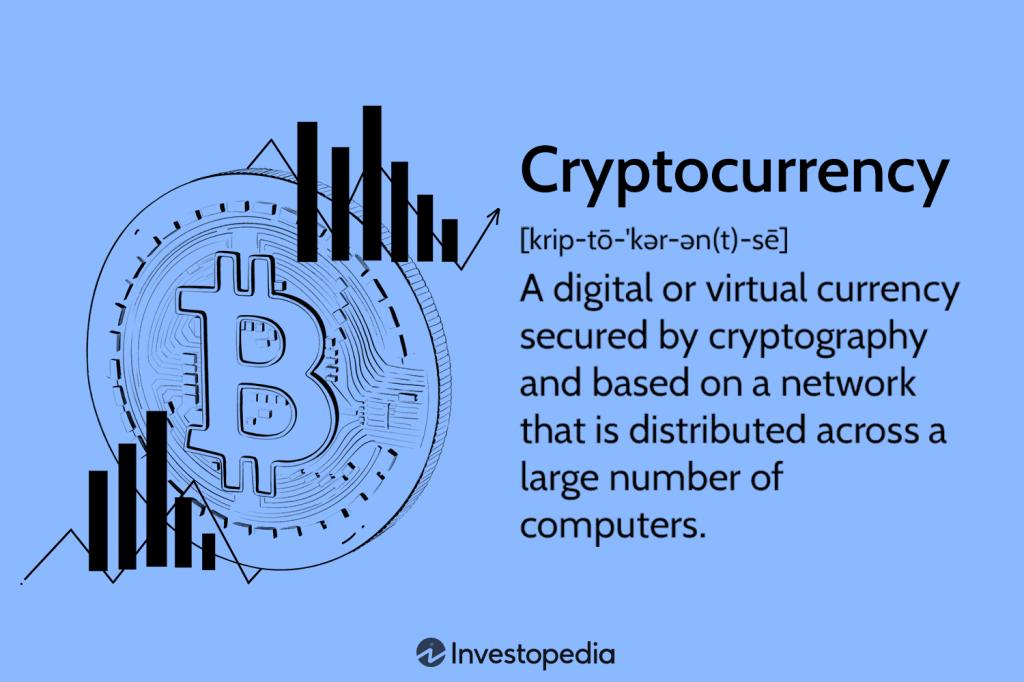Unlock The Potential Of Cryptocurrency: Your Key To Financial Freedom
Cryptocurrency: A Revolutionary Digital Currency
Introduction
Dear Readers,
3 Picture Gallery: Unlock The Potential Of Cryptocurrency: Your Key To Financial Freedom



Welcome to the world of cryptocurrency, a revolutionary digital currency that has taken the financial industry by storm. In this article, we will delve into the intriguing world of cryptocurrencies, exploring their origins, benefits, drawbacks, and everything in between. Whether you are a novice or an experienced investor, this article aims to provide you with a comprehensive understanding of this exciting phenomenon.
What is Cryptocurrency? 🌐💰

Image Source: toptal.io
Cryptocurrency is a form of digital or virtual currency that utilizes cryptography for secure financial transactions, control the creation of additional units, and verify the transfer of assets. Unlike traditional fiat money issued by central banks, cryptocurrencies operate on decentralized networks using blockchain technology. Popular examples of cryptocurrencies include Bitcoin (BTC), Ethereum (ETH), and Ripple (XRP).
A Brief History
The concept of cryptocurrency was introduced by an anonymous person or group known as Satoshi Nakamoto in 2008. Nakamoto’s whitepaper on Bitcoin outlined the fundamentals of this new digital currency, which soon gained popularity among tech enthusiasts and financial pioneers.
How Does it Work?
Cryptocurrencies work through a decentralized network of computers, also known as nodes, that maintain a shared ledger called the blockchain. Transactions are recorded on the blockchain, ensuring transparency, security, and immutability. Miners, individuals who contribute their computing power, verify and validate these transactions, for which they are rewarded with newly created cryptocurrency tokens.
Advantages of Cryptocurrency

Image Source: upenn.edu
🔹 Secure Transactions: Cryptocurrencies use advanced cryptographic techniques to ensure the security and privacy of transactions.
🔹 Decentralization: As cryptocurrencies operate on decentralized networks, they are not controlled by any central authority, making them immune to government interference and manipulation.

Image Source: investopedia.com
🔹 Global Accessibility: Cryptocurrencies enable seamless transactions across borders and eliminate the need for traditional intermediaries, such as banks.
🔹 Lower Transaction Fees: Due to the absence of intermediaries, cryptocurrency transactions typically have lower fees compared to traditional financial systems.
🔹 Investment Opportunities: Cryptocurrencies offer potential investment opportunities, as their value can fluctuate significantly, allowing investors to earn substantial profits.
Disadvantages of Cryptocurrency
🔹 Volatility: Cryptocurrency markets are highly volatile, with prices often experiencing significant fluctuations within short periods.
🔹 Limited Acceptance: Although the adoption of cryptocurrencies is growing, their acceptance as a mainstream form of payment is still limited.
🔹 Regulatory Uncertainty: The regulatory landscape surrounding cryptocurrencies is constantly evolving, leading to uncertainty and potential legal challenges.
🔹 Security Risks: While cryptocurrencies offer enhanced security features, there is still a risk of hacking, scams, and theft due to vulnerabilities in exchanges and wallets.
🔹 Environmental Impact: The energy consumption required for cryptocurrency mining has raised concerns about its environmental impact, particularly in the case of Bitcoin.
Who Uses Cryptocurrency? 🤔👥
Cryptocurrency usage is diverse, with individuals, businesses, and even governments adopting this digital currency for various purposes. While some individuals use cryptocurrencies for everyday transactions and online purchases, others view them as investment assets or tools for fundraising through Initial Coin Offerings (ICOs). Additionally, businesses are increasingly accepting cryptocurrencies as payment, recognizing their potential to streamline international transactions and reduce costs.
Government Adoption
Several countries have explored the implementation of cryptocurrencies on a national scale. For instance, the government of El Salvador has made Bitcoin legal tender, while other countries like China and Sweden are exploring the development of their central bank digital currencies (CBDCs).
Global Reach
Cryptocurrencies have gained significant traction globally, with millions of users participating in this decentralized financial ecosystem. The borderless nature of cryptocurrencies allows individuals from different corners of the world to transact, invest, and collaborate without the need for traditional banking systems.
When Did Cryptocurrency Emerge? 📅⌛
The first cryptocurrency, Bitcoin, was introduced in 2009, marking the beginning of this digital revolution. Since then, numerous cryptocurrencies have emerged, each with its unique features and applications. The growth and development of the cryptocurrency market continue to evolve at a rapid pace, with new projects and innovations constantly being introduced.
Where Can You Use Cryptocurrency? 🌍🏦
Cryptocurrencies can be used in various ways and across different sectors. While some online retailers and service providers accept cryptocurrencies as a form of payment, others use them for investment purposes. Additionally, cryptocurrencies have found utility in industries such as gaming, remittances, and decentralized finance (DeFi).
Why Use Cryptocurrency? 🤔💭
The use of cryptocurrencies offers several advantages over traditional financial systems:
Financial Freedom
Cryptocurrencies provide individuals with greater financial autonomy and control over their money, allowing them to bypass traditional banking systems.
Enhanced Privacy
Cryptocurrencies offer users increased privacy and anonymity during transactions, as they do not require personal information to complete payments.
Lower Transaction Costs
Transactions conducted with cryptocurrencies often have lower fees compared to traditional financial systems, making them an attractive alternative for individuals and businesses.
How Can You Get Started with Cryptocurrency? 🚀🔑
To begin your cryptocurrency journey, follow these steps:
1. Educate Yourself
Start by conducting thorough research and familiarizing yourself with the fundamentals of cryptocurrencies, blockchain technology, and the risks involved.
2. Choose a Reliable Exchange
Select a reputable cryptocurrency exchange platform to buy, sell, and store your cryptocurrencies securely.
3. Secure Your Cryptocurrencies
Take necessary measures to ensure the safety of your digital assets by using hardware wallets or secure software wallets.
4. Diversify Your Portfolio
Consider investing in multiple cryptocurrencies to spread your risk and take advantage of different investment opportunities.
Frequently Asked Questions (FAQs)
1. Are cryptocurrencies legal?
Yes, cryptocurrencies are legal in most countries, but specific regulations may vary. It is important to understand the legal landscape and comply with relevant regulations.
2. Can I lose my cryptocurrencies?
While cryptocurrencies can be lost if you misplace your private keys or fall victim to fraud, taking adequate security measures can minimize these risks.
3. How do I choose the right cryptocurrency to invest in?
Choosing the right cryptocurrency to invest in requires thorough research, considering factors such as the project’s technology, team, market demand, and long-term potential.
4. How can I protect my cryptocurrencies from hacking?
To protect your cryptocurrencies from hacking, use secure wallets, enable two-factor authentication, and avoid sharing sensitive information online.
5. Can cryptocurrencies replace traditional currencies?
While the future role of cryptocurrencies in our financial systems remains uncertain, they have the potential to coexist with traditional currencies, offering alternative payment methods and investment opportunities.
Conclusion: Embrace the Future of Finance
Friends, the world of cryptocurrency presents an exciting frontier for financial innovation and inclusivity. By embracing this digital revolution, you can gain financial freedom, explore new investment opportunities, and contribute to the growth of a global decentralized ecosystem. Take the first step today and embark on your cryptocurrency journey!
Final Remarks
In conclusion, it is essential to note that the cryptocurrency market remains highly volatile and subject to market risks. This article serves as an informative guide and should not be considered as financial advice. Prior to making any investment decisions, conduct thorough research and consult with a professional financial advisor. Stay vigilant, stay informed, and navigate the cryptocurrency landscape with caution.
Cryptocurrency
Description
Bitcoin (BTC)
The first and most well-known cryptocurrency, introduced by Satoshi Nakamoto in 2009.
Ethereum (ETH)
A decentralized platform that enables developers to build and deploy smart contracts and decentralized applications.
Ripple (XRP)
A digital payment protocol that facilitates fast and low-cost international money transfers.
Litecoin (LTC)
An early Bitcoin alternative that offers faster transaction confirmation times and a different hashing algorithm.
Cardano (ADA)
A blockchain platform that aims to provide a secure and scalable infrastructure for the development of decentralized applications and smart contracts.
This post topic: Blockchain Insights

